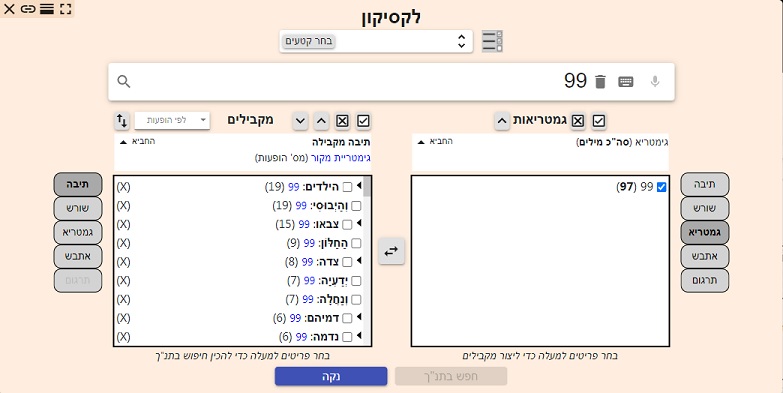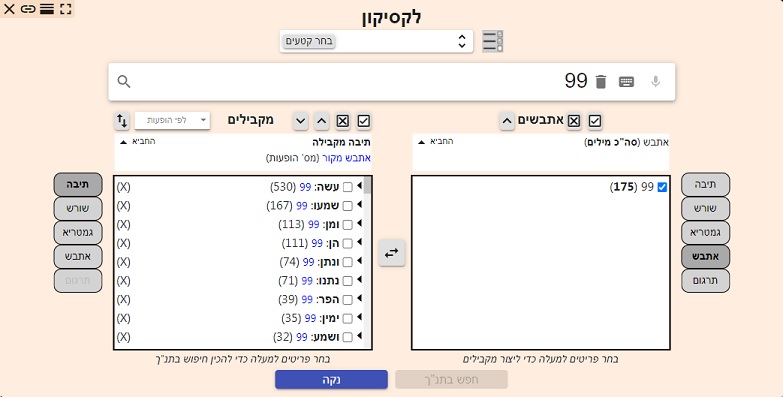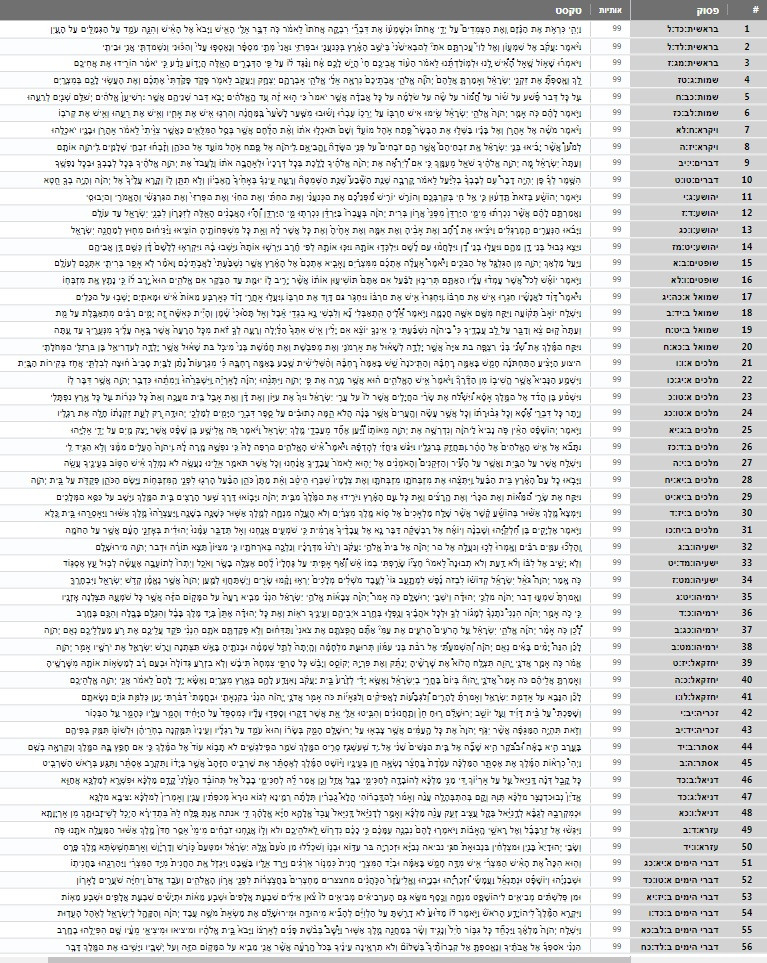Who knows ninety-nine?
Please cite/link your sources, if possible. At some point at least twenty-four hours from now, I will:
Upvote all interesting answers.
Accept the best answer.
Go on to the next number. (Get ready ...)
The "gozrei gezeiros" (civil-court judges) of Jerusalem received an annual salary of 99 maneh from the treasury of the Beis Hamikdash. (Kesubos 105a)
There are 99 numbered Selichos in my "Minhag Lita" Selichos book.
99 were the years before Avraham's Bris. (Gen. 17:24).
It almost fits the beat.
(דברים ז, טו) והסיר ה' ממך כל חולי אמר רב זו עין רב לטעמיה דרב סליק לבי קברי עבד מאי דעבד אמר תשעין ותשעה בעין רעה ואחד בדרך ארץ
§ The Gemara returns to expounding the themes of blessings and the evil eye. The Torah states: “And the Lord will take away from you all sickness” (Deuteronomy 7:15). In interpreting this verse, Rav says: This verse is speaking about the evil eye. The Gemara comments: Rav conforms to his line of reasoning, as Rav went to a graveyard, and did what he did, i.e., he used an incantation to find out how those buried there died, and he said: Ninety-nine of these died by the evil eye, and only one died by entirely natural means.
Bava Metzia 107b
וּבִמְלֹאת יְמֵי טָהֳרָה וְגוֹ'. לָמָּה הִיא מְבִיאָה קָרְבָּן. אָמְרוּ רַבּוֹתֵינוּ זִכְרוֹנָם לִבְרָכָה: מֵאָה פְּעִיּוֹת הָאִשָּׁה פּוֹעָה, שֶׁנֶּאֱמַר: הֵן אַתֶּם מֵאַיִן וּפָעֳלְכֶם מֵאָפַע (ישעיה מא, כד). מַהוּ מֵאָפַע. מֵאָה פּוּעוֹת הִיא פּוֹעָה כְּשֶׁהִיא יוֹשֶׁבֶת עַל הַמַּשְׁבֵּר, תִּשְׁעִים וָתֵשַׁע לְמִיתָה, וְאַחַת לְחַיִּים. וְכֵיוָן שֶׁהַצָּרוֹת מַקִּיפוֹת אוֹתָהּ, הִיא נוֹדֶרֶת שֶׁלֹּא תִּזָּקֵק עוֹד לְאִישָׁהּ. לְפִיכָךְ מְבִיאָה קָרְבָּן, שֶׁנֶּאֱמַר: תָּבִיא כֶּבֶשׂ בֶּן שְׁנָתוֹ.
(Lev. 12:6:) “And when the days of her purification are fulfilled [for either a son or for a daughter, she shall bring a lamb in its first year for a burnt offering….]” Why does she bring an offering? Our masters have said, “She screams a hundred times when she sits on the birthing chair, as stated (Is. 41:24), ‘Behold you are like nothing, and your actions are less than zero.’ What is [the meaning of] ‘less than zero (me’effa)?’ There are one hundred screams (meah puot), ninety-nine for death and one for life. And when the pangs arrive for her, she vows that she will never favor her husband [with sexual intercourse] again. She therefore brings an offering, as stated (ibid.), ‘she shall bring a lamb in its first year.’”
Vayikra Raba 27:5
יש מצות הנוהגות בזמן הזה והם בין כולם ג' מאות ששים ותשעה. ויש מאלו הנוהגות שלא יתחייב בהן האדם כי אם בסבה ופעמים שלא תבא הסבה לו לאדם בכל ימיו ונמצא שלא יעשה אותה לעולם כגון מצות נתינת שכר שכיר ביומו שיש מבני אדם שלא ישכור שכיר בימיו וכל כיוצא בה. וכן מן הלאוין יש קצת מהן שלא יתחייב עליהן האדם כי אם מרצונו ועל ידי סבת מעשיו ובהמנעו מאותו המעשה לא יהיה עליו חטא ולא יחסר אליו דבר כגון מוציא שם רע שלא יגרש אשתו לעולם שהוא הגורם על עצמו להתחייב בלאו הזה כי הוא הוציא שם רע וכן לאו דלא תאחר בנדרים הוא ג"כ גורם אותו ומי שיחדל לנדור לא יהיה בו חטא וכן כל כיוצא בזה והם בין כולם תשעה ותשעים מהן שמנה ושבעים עשה ואחד ועשרים לא תעשה. אבל אותם מצות שחייבין בהם כל אדם מישראל מבלי שיתחדש בו סבה בעולם הם בין כולם מאתים ושבעים וסימנם אני ישנה ולבי ע"ר. מהם שמונה וארבעים עשה ושנים ועשרים ומאתים לאוין ותמצא כל אחת בסדר שלה בתוך הספר והחיוב של אלו לעשותן אינו בכל עת רק בזמנים ידועים מהשנה או מן היום חוץ מששה מצות מהן שחיובן תמידי לא יפסק מעל האדם אפי' רגע בכל ימיו. ואלו הם. א' להאמין בשם. ב' שלא להאמין לזולתו. ג' ליחדו. ד' לאהבה אותו. ה' ליראה אותו. ו' שלא לתור אחר מחשבת הלב וראיית העינים. סימנם שש ערי מקלט תהיינה לכם:
There are commandments that are practiced today and, all counted, they are three hundred and sixty-nine. And from these that are practiced, there are some that a person only be obligated in them by a cause. And sometimes the cause will never come to a person all of his days, such that it will come out that he never do [that commandment] — such as the commandment of giving the wage to a wageworker on its day, and that which is similar to it; as there are people that will never employ a wageworker [all] their days. And so [too,] from the negative commandments, there are some of them that a person not be obligated without his will, and through the cause of his deeds. And with his avoiding that deed, there will not be any sin to him and nothing will be lacking from him. For example, one who puts out a bad name [on his wife], that he may never divorce his wife — as he caused it to himself to be obligated in this negative commandment, as he is the one who put out a bad name. And so [too,] with the negative commandment of “do not delay” with vows, it is also he who causes it. And one who refrains from vowing will not have a sin. And so, all that is similar to this. And, all counted, they are ninety-nine, from which there are seventy-eight positive commandments and twenty-one negative commandments. But the commandments that every man of Israel is commanded without his creating a cause for it in the world are, all counted, two hundred and seventy. And the mnemonic is “I am sleeping, but my heart is awake” (er, the numerical equivalent of its letters being two hundred and seventy). Forty-eight of them are positive commandments and two hundred and twenty-two are negative commandments. And you will find each one in its [weekly reading] in the book. And the obligation with them is not at all times, but rather at specific times of the year or of the day — except for six commandments, the obligation of which is constant. It does not cease from being upon a man even an instant in all of his days. And these are them: 1) to believe in God; 2) to not believe in anything besides Him; 3) to conceive of His oneness; 4) to love Him; 5) to fear Him; and 6) to not wander after the thought of the heart and the vision of the eyes. Their mnemonic is “six cities of refuge shall there be for you.”
Sefer Chinuch, beginning.
Midrash ha-Gadol (preserved from Yemen), at Genesis 10:32, has it that there are ninety-nine islands:
"The total number of the countries that the children of Noah divided among their descendants was 104; of islands, 99; of languages, 72; and of scripts, 16. To the share of Japheth fell 44 countries, 33 islands, 22 languages, and 5 scripts; Ham received 34 countries, 33 islands, 24 languages, and 5 scripts; Shem, 26 countries, 33 islands, 26 languages, and 6 scripts."
הַפֵּאָה נִתֶּנֶת בִּמְחֻבָּר לַקַּרְקָע. בְּדָלִית וּבְדֶקֶל, בַּעַל הַבַּיִת מוֹרִיד וּמְחַלֵּק לָעֲנִיִּים. רַבִּי שִׁמְעוֹן אוֹמֵר, אַף בַּחֲלִיקֵי אֱגוֹזִים. אֲפִלּוּ תִשְׁעִים וְתִשְׁעָה אוֹמְרִים לְחַלֵּק וְאֶחָד אוֹמֵר לָבוֹז, לָזֶה שׁוֹמְעִין, שֶׁאָמַר כַּהֲלָכָה:
Peah is given from [the crop] while it is still connected with the soil. But in the case of hanging vine-branches and the date-palm, the owner brings down [the fruit] and distributes it among the poor. Rabbi Shimon says: the same applies to smooth nut trees. Even if ninety-nine [of the poor] say [to the owner] to distribute it and one says to leave it in the field, this latter is listened to, since he spoke in accordance with the halakhah.
Mishnah Peah 4:2
פֵּאָה שֶׁל דָּלִית וְשֶׁל דֶּקֶל שֶׁאֵין עֲנִיִּים מַגִּיעִין לָבֹז אוֹתָהּ אֶלָּא בְּסַכָּנָה גְּדוֹלָה. בַּעַל הַבַּיִת מוֹרִיד אוֹתָהּ וּמְחַלֵּק אוֹתָהּ בֵּין הָעֲנִיִּים. וְאִם רָצוּ כֻּלָּן לָבֹז אוֹתָהּ לְעַצְמָן בּוֹזְזִין. אֲפִלּוּ תִּשְׁעִים וְתִשְׁעָה אוֹמְרִים לָבֹז וְאֶחָד אוֹמֵר לְחַלֵּק שׁוֹמְעִין לָאֶחָד שֶׁאָמַר כַּהֲלָכָה וּמְחַיְּבִין בַּעַל הַבַּיִת לְהוֹרִיד וּלְחַלֵּק בֵּינֵיהֶן:
Pe'ah from a grape vine [draped over a high wall] and from a date palm that the poor cannot reach to grab except at great danger the owner of the land should bring it down and divide it among them. If they all desire that it be left to be grabbed, that option is followed. If, however, ninety-nine say that they desire that it be left to be grabbed and one says that it should be divided, we listen to the latter, for his statement is in accord with Torah law. We obligate the owner to bring it down and divide it among them.
Mishnah Torah, gifts to the poor, 2.
Sifra, Kedoshim, ch. 3
All ninety seven words in Tanach with a gematria of 99 (need to scroll down for the full list when arrive at that window)

All one hundred and seventy five words in Tanach with an atbash value of 99 (scroll down for the full list)

All thirteen parshios in Tanach containing exactly 99 words

All eight parshios in Tanach containing exactly 99 letters

All fifty six pesukim in Tanach containing exactly 99 letters
